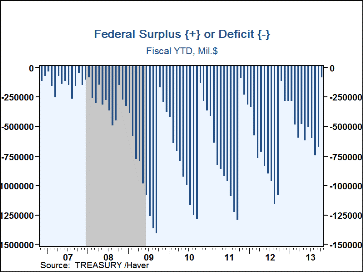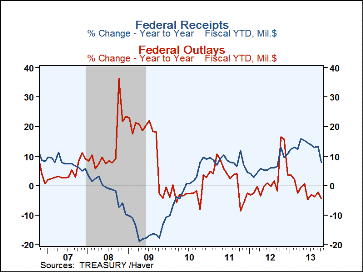 Global| Nov 13 2013
Global| Nov 13 2013U.S. Budget Deficit Shrinks; Revenues Jump and Spending Falls
by:Tom Moeller
|in:Economy in Brief
Summary
The Federal Government ran a $91.6 billion budget deficit during October of FY 2014. During October of last year the government ran a $120.0 billion deficit. The latest figure compared to the Action Economics Forecast Survey [...]
The Federal Government ran a $91.6 billion budget deficit during October of FY 2014. During October of last year the government ran a $120.0 billion deficit. The latest figure compared to the Action Economics Forecast Survey expectation of a $104.2 billion shortfall. The shrinking budget deficit continues the improvement which was notable last year. The FY 2013 deficit of $680.3 billion was down sharply from $1,089 billion in FY 2012 and the $1,416 billion peak in FY 2009.
Driving the improvement in October's budget balance was a 7.9% y/y rise in revenues. That reflected a three-fold surge in corporate tax payments as well as a 20.5% y/y rise in social insurance tax payments, the result of higher employment and the expiration of the social security tax cut. Individual income tax payments fell slightly following a surge earlier this year. For FY 2013, personal revenues rose 13.3% y/y. The improved labor market raised income taxes 16.3% from FY'12. Corporate taxes also jumped due to improved profits while social insurance taxes gained 12.1% y/y with higher payrolls.
On the spending side, sequestration and the government shutdown helped net outlays fall 4.5% y/y, following declines of 2.4% y/y and 1.7% y/y during the prior two fiscal years. Declines in defense outlays occurred with the winding down of the war in Afghanistan. Medicare outlays also were off 2.4% y/y during the last twelve months. Income security payments fell 5.1% y/y and have been down since late-2010 with the improved job market. Interest payments likewise fell a sharp 18.1% y/y with the deficit's decline. To the upside, health program outlays increased 6.8% y/y after a 3.1% gain last fiscal year. Social security outlays gained 5.1% y/y after a like rise in FY 2013. Veterans benefits rose 6.7% y/y after an 11.5% rise last fiscal year.
Haver's basic data on Federal Government outlays and receipts, and summary presentations of the Budget from both OMB and CBO are contained in USECON. Considerable detail is given in the separate GOVFIN database.
| US Government Finance | Oct | FY'13 | FY'12 | FY'11 | FY'10 | |
|---|---|---|---|---|---|---|
| Budget Balance | -- | $91.6B | $-680.3B | $-1,089B | $-1,298.7B | $-1,294.2B |
| As a percent of GDP | -- | -- | 4.1 | 6.8 | 8.4 | 8.8 |
| % of Total | YTD FY'14 | |||||
| Net Revenues (Y/Y % Change) | 100 | 7.9% | 13.3% | 6.4% | 6.5% | 2.7% |
| Individual Income Taxes | 47 | -2.9 | 16.3 | 3.7 | 21.5 | -1.8 |
| Corporate Income Taxes | 10 | 400 | 12.9 | 33.8 | -5.4 | 38.5 |
| Social Insurance Taxes | 34 | 20.5 | 12.1 | 3.2 | -5.3 | -2.9 |
| Excise Taxes | 3 | -12.2 | 6.3 | 9.2 | 8.2 | 7.1 |
| Net Outlays (Y/Y % Change) | 100 | -4.5 | -2.4 | -1.7 | 4.1 | -1.8 |
| National Defense | 18 | -8.3 | -6.3 | -3.9 | 1.7 | 4.6 |
| Health | 10 | 6.8 | 3.1 | -7.0 | 1.0 | 10.4 |
| Medicare | 14 | -2.4 | 5.5 | -2.8 | 7.5 | 5.0 |
| Income Security | 16 | -5.1 | -1.1 | -9.1 | -4.1 | 16.7 |
| Social Security | 24 | 5.1 | 5.2 | 5.8 | 3.4 | 3.5 |
| Veterans Benefits | 4 | 6.7 | 11.5 | -2.0 | 17.3 | 13.6 |
| Interest | 6 | -18.1 | 0.4 | -3.0 | 15.8 | 2.9 |
Tom Moeller
AuthorMore in Author Profile »Prior to joining Haver Analytics in 2000, Mr. Moeller worked as the Economist at Chancellor Capital Management from 1985 to 1999. There, he developed comprehensive economic forecasts and interpreted economic data for equity and fixed income portfolio managers. Also at Chancellor, Mr. Moeller worked as an equity analyst and was responsible for researching and rating companies in the economically sensitive automobile and housing industries for investment in Chancellor’s equity portfolio. Prior to joining Chancellor, Mr. Moeller was an Economist at Citibank from 1979 to 1984. He also analyzed pricing behavior in the metals industry for the Council on Wage and Price Stability in Washington, D.C. In 1999, Mr. Moeller received the award for most accurate forecast from the Forecasters' Club of New York. From 1990 to 1992 he was President of the New York Association for Business Economists. Mr. Moeller earned an M.B.A. in Finance from Fordham University, where he graduated in 1987. He holds a Bachelor of Arts in Economics from George Washington University.








